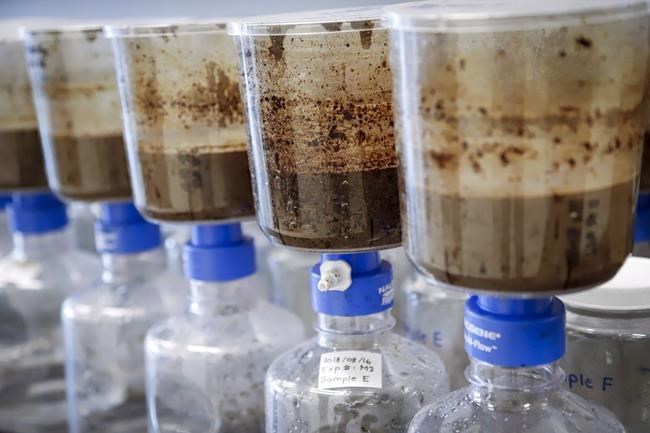Federal inspectors have ruled a releaseof oilsands wastewater from Imperial Oil Ltd.'s Kearl mine is harmful to wildlife and have ordered the company to take immediate action to stop seepage from a tailings pond.
"Based on information enforcement officers have to date, the seep is believed to be deleterious, or harmful, to fish," Environment Canada spokeswoman Nicole Allen said in a statement.
"On March 10, 2023, enforcement officers issued a Fisheries Act direction to Imperial Oil. The direction requires immediate action to contain the seep and prevent it from entering a fish-bearing waterbody."
Seepage from the Kearl site about 70 kilometres from Fort McMurray, Alta., was first noticed in May, but neither Imperial nor the Alberta Energy Regulator kept local First Nations or provincial and federal environment officials briefed. News of the leak came out Feb. 7 in an environmental protection order from the regulator, after another release of 5.3 million litres of tailings from a catchment pond at the site.
Federal officials have said Alberta is required to notify it of such leaks within 24 hours.
The realization that nine months had passed between the discovery of the original release and the public announcement drew widespread anger from First Nations, who harvest from land near the site. Arthur Noskey, Grand Chief of the Treaty 8 First Nations, added his voice over the weekend.
"Identify the causes of Imperial's tailings breaches and find a resolution immediately," he wrote. "Imperial and the governments must contain tar sands' toxic leaks."
The government of the Northwest Territories said it should also have been informed, given a bilateral agreement it has with Alberta over the shared watershed.
Allen said government directions are tools used by the federal minister when there is an unauthorized release of a harmful substanceinto water frequented by fish or when there is a "serious and imminent danger of such an incident and immediate action is necessary."
Imperial is complying, said company spokeswoman Lisa Schmidt in an email.
"We are responding to the direction that was provided by ECCC officials following their visit to Imperial’s Kearl site last week and we have installed surface water pumps in the area to prevent the seep from entering a fish-bearing waterbody.
"Monitoring to date at this waterbody indicates there has been no change in baseline conditions. We plan to collect the fish from this waterbody as a precaution and install a fish barrier to prevent migration."
Alberta Premier Danielle Smith has said there were no wildlife impacts and drinking water was not compromised.
Environment Canada will continue to monitor the release cleanup, Allen said.
"Inspectors are to return to the Kearl site in the coming days to assess the measures Imperial has taken to stop the seeping, which is occurring on land near two tributaries to the Athabasca River," she said.
"Officers are to remain at the site to monitor the cleanup as well as collect more information to see if the federal Fisheries Act has been broken."
This report by The Canadian Press was first published March 13, 2023.
Bob Weber, The Canadian Press




